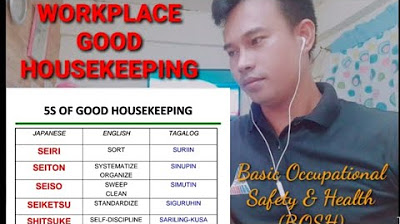How to be Organized at Work [WORK ORGANIZATION SKILLS YOU NEED]
Summary
TLDRThis video offers practical tips for enhancing workplace organization. The speaker emphasizes the importance of avoiding multitasking to ensure quality work, suggests organizing your mind through meditation and proper sleep, and recommends taking regular breaks. Physical workspace organization is covered with the '360 method', ensuring essential items are within reach. Electronic organization is also discussed, with advice on managing emails and using calendars effectively. The video concludes with a teaser for additional content on project management and organizational success.
Takeaways
- 🚫 Stop multitasking: It's a myth that multitasking leads to better organization; focusing on one task at a time improves work quality.
- 🧘 Organize your brain: Techniques like meditation and proper sleep can reduce stress and enhance focus, contributing to better organization.
- ⏲️ Take breaks: Regular short breaks can help maintain focus and organization throughout the workday.
- 🔄 Organize your workspace: Implement the 360 method to keep essential items within easy reach and reduce unnecessary movement.
- 🧹 Clean your workspace daily: Ending the day with a tidy desk sets a positive tone for the next day's organization.
- 📧 Organize your email: Avoid using your inbox as a filing cabinet; process emails promptly and keep your inbox lean.
- 📅 Use your calendar wisely: Block out 'power hours' for focused work and manage your calendar to reflect your availability and priorities.
- 📈 Understand why projects fail: Gain insights into common project pitfalls to improve your organizational skills in business activities.
- 🔗 Subscribe and engage: Stay updated with organizational tips by subscribing to the channel and engaging with the community.
- 💡 Share your tips: Contribute to the collective knowledge by sharing your own organizational techniques in the comments.
Q & A
What is the main focus of the video?
-The main focus of the video is to share effective organizational techniques to improve productivity and orderliness at work.
What is the first organizational tip shared in the video?
-The first organizational tip shared in the video is to stop multitasking, as it is considered a myth and detracts from the quality of work.
Why is multitasking considered a mistake in the context of organization?
-Multitasking is considered a mistake because it has been proven that people cannot effectively multitask, and it reduces the quality of work, especially for tasks requiring brain and logic.
What is suggested to help organize one's brain?
-To organize one's brain, the video suggests meditation to reduce stress and stay in the moment, getting the right amount of sleep, and taking mini breaks during the workday.
What is the 360 method mentioned in the video?
-The 360 method is a technique where everything one touches and needs constantly and daily should be within a 360-degree circle of their workspace, ensuring everything is at fingertips.
How does the video recommend organizing one's workspace?
-The video recommends organizing the workspace by applying the 360 method, clearing the desk off at the end of the day, and strategizing what is needed at fingertips.
What advice is given for electronic organization, specifically with emails?
-For electronic organization, the video advises not to use the email inbox as a filing cabinet, to touch emails once and file them away promptly, and to delete unnecessary emails to keep the inbox clean.
Why is it important to use an email calendar according to the video?
-Using an email calendar is important to maintain organization by blocking out power hours, respecting time blocks, and teaching others how to use your calendar effectively.
What is the significance of blocking out power hours in the calendar?
-Blocking out power hours in the calendar is significant because it ensures dedicated, uninterrupted time for work, which helps maintain organization and productivity.
What additional resource is offered at the end of the video to help with business activities?
-At the end of the video, a link is offered to access information on why projects fail, which can help improve organizational skills in business activities beyond just projects.
How often does the video recommend checking emails during the day?
-The video suggests checking emails once or twice a day, depending on one's role, to maintain organization and not let the inbox get out of control.
Outlines

このセクションは有料ユーザー限定です。 アクセスするには、アップグレードをお願いします。
今すぐアップグレードMindmap

このセクションは有料ユーザー限定です。 アクセスするには、アップグレードをお願いします。
今すぐアップグレードKeywords

このセクションは有料ユーザー限定です。 アクセスするには、アップグレードをお願いします。
今すぐアップグレードHighlights

このセクションは有料ユーザー限定です。 アクセスするには、アップグレードをお願いします。
今すぐアップグレードTranscripts

このセクションは有料ユーザー限定です。 アクセスするには、アップグレードをお願いします。
今すぐアップグレード関連動画をさらに表示

Safety Tips: 5'S of GOOD HOUSEKEEPING | Usapang Safety | Basic Occupational Safety & Health (BOSH)

15 Astuces pour mieux utiliser votre Mac !

Oral Communication in Context - Listening

how I went from FAILING to becoming a TOP STUDENT | TOP 10 BEST STUDY TIPS + free printable

Create a healthier workplace

BUDAYA KERJA 5R
5.0 / 5 (0 votes)
